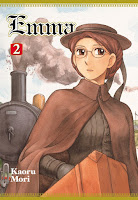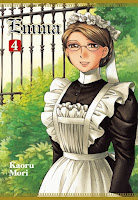Emma originally ran for 72 chapters -- 52 of the main story, and a follow-up 20 side-story chapters -- in Japan's Beam magazine from 2002 through 2008. It was collected into ten volumes, with the side-stories taking up the last three, then the volumes were translated into English. At some point, there were hardcovers, each collecting two of the smaller paperback tankobon volumes. And that's what I just read: 72 serial chapters, 10 paperbacks, or five hardcovers. (Links to Volumes One, Two, Three, Four and Five)
 It's set in the transition from the Victorian to the Edwardian era in England, starting in what seems to be the late 1890s and continuing for a few years past Victoria's death in 1901. (There are no actual dates in the series, but Mori does contrast Victorian and Edwardian clothing styles in her afterwords without a whole lot of explanation...I don't think she believes that everything changed poof! all at once. It is also difficult to judge how much time is passing, since even the old characters are mostly drawn with young faces.) The central character is Emma, a young woman of uncertain parentage and no actual last name, initially working as the maid-of-all-work in the London home of retired governess Kelly Stowner.
It's set in the transition from the Victorian to the Edwardian era in England, starting in what seems to be the late 1890s and continuing for a few years past Victoria's death in 1901. (There are no actual dates in the series, but Mori does contrast Victorian and Edwardian clothing styles in her afterwords without a whole lot of explanation...I don't think she believes that everything changed poof! all at once. It is also difficult to judge how much time is passing, since even the old characters are mostly drawn with young faces.) The central character is Emma, a young woman of uncertain parentage and no actual last name, initially working as the maid-of-all-work in the London home of retired governess Kelly Stowner. Emma meets and falls in love with William Jones, scion of a rich and rising merchant family, who also loves her. But there are the usual impediments: their respective positions in life, William's engagement to the daughter of a Viscount, his stern father, blah blah blah and so on.
Emma meets and falls in love with William Jones, scion of a rich and rising merchant family, who also loves her. But there are the usual impediments: their respective positions in life, William's engagement to the daughter of a Viscount, his stern father, blah blah blah and so on.Reader, of course they get married in the end. We all know that. So I won't pretend otherwise.
 My problem is that the problems in their way are neither fish nor fowl. I'd be happy with a Dickensian drama with melodramatic problems solved in melodramatic ways -- if one party were kidnapped to America by characters who look a lot like 19th century Jewish stereotypes, for example, and the other party had to chase her there and save her from durance vile -- and I'd also be happy with a more serious, sedate story of manners and closely examined social mores of the time. Emma is neither of those. This story instead throws in a couple of melodramatic moments for no clear reason (like that abduction by racist stereotypes), but generally steers a sedate course without actually closely examining the actual standards of the society it concerns.
My problem is that the problems in their way are neither fish nor fowl. I'd be happy with a Dickensian drama with melodramatic problems solved in melodramatic ways -- if one party were kidnapped to America by characters who look a lot like 19th century Jewish stereotypes, for example, and the other party had to chase her there and save her from durance vile -- and I'd also be happy with a more serious, sedate story of manners and closely examined social mores of the time. Emma is neither of those. This story instead throws in a couple of melodramatic moments for no clear reason (like that abduction by racist stereotypes), but generally steers a sedate course without actually closely examining the actual standards of the society it concerns.Emma, frankly, is a caricature of circa-1900 English society as seen through the lens of circa-2002 Japanese society: the aspects that resonate with Mori and her audience are emphasized, and the ones that would be inconvenient to this story are ignored or changed or misunderstood.
Some of my major issues with Emma:
- the narrative seems to have never even heard of a "breach of promise" suit
- a "former governess" lives in what would be an expensive London townhouse, perhaps because she became a governess as something to do after her husband died
- in general, money may exist, but the lack of it does not seem to harm or motivate a single person in the world
- an honest-to-God kidnapping happens and is never mentioned afterward
- the entire race of the "the Irish" seem not to exist in this world, or at least to have no connection to domestic service
- it's yet another comic series whose narrative is apparently driven primarily by what the artist wanted to draw, and not any actual story purpose
- fans of the series, and possibly even its creator, seem to be mostly interested in "stories about maids" and details of their clothing, rather than any actual story points
 This is not an exhaustive list.
This is not an exhaustive list.On the other hand, Emma looks gorgeous, and the character interaction on a scene-by-scene level is true and engaging. I might not always believe that all of Mori's characters actually are British people born in the 19th century, but they're interesting, distinct people no matter how ahistorical they may be. Their interactions are realistic, and if Emma had not insisted on its historicity, it could all be taken as the ways these people in this society interact.
I expect most readers won't care about any of that. It's a nice love story, sweet and totally innocent, as befitting the time-period. (Though there is quite a bit of female nudity in Emma, both of an older married woman and of a high-class prostitute, so it's not appropriate for anyone looking for absolute purity of the Christian Dominionist strain.) And, again, I'm quite happy with ahistorical melodramatic stories -- or solidly historical melodramatic stories, for that matter -- but if something pretends to be serious and grounded, it should actually be so, and not just pretend to it.

1 comment:
I read the first two, I think, and said, nah. Artwork was really nice, but the storyline didn't entice.
Post a Comment